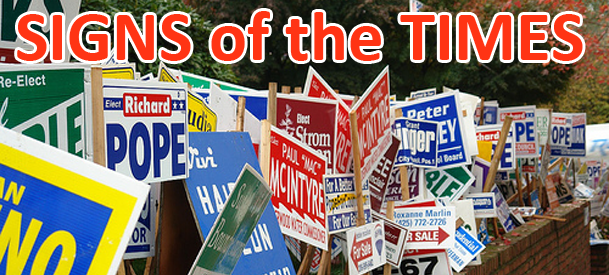
In June of this year, the US Supreme Court ruled in favor of a small church in Gilbert, AZ in its suit brought against the city for restrictions that limited the display of signs for its services. The Court cited the First Amendment in ruling that city regulations regarding size and display times of signs could not be distinguished by sign content. Whether political propaganda or religious service parking instructions, all signs must adhere to the same sets of regulations.
Three years prior, the New Jersey Supreme Court ruled in favor of a homeowner who violated his HOA’s CC&Rs by displaying signs in his windows advertising his political candidacy for a local election. The HOA restricted signage to only “For Sale” signs, but the Court in this case found that the state constitution barred the discrimination of sign content and overturned HOA fines.
Other rulings and court battles in Virginia over political signs and flagpoles, Arizona over gay-pride flags, and Illinois over religious displays highlight the potential legal minefield board members might be stepping into with covenant enforcement. In one of the Virginia cases, the association was ordered to pay $100,000 to the homeowner plaintiffs, after spending nearly $400,000 in legal fees. With so many examples in the headlines of HOAs facing lawsuits over apparent First Amendment infringements or selective CC&R enforcement, it is important for board members to be apprised of local, state, and federal laws, where these might be at odds with the CC&Rs, and how to prevent legal action that could cost the association its operating budget and ability to administer community services and functions.
While free speech protections do not necessarily apply to private entities, such as homeowners associations, the enforcement of rules that could be interpreted as limiting free speech by private entities, which are governed by state statutes, could be ruled as unreasonably restrictive. It is important to note that the existence of sign restrictions in an association’s CC&Rs does not represent a violation of free speech rights; it is the enforcement of these restrictions that might give homeowners potential grounds for lawsuit. While you might not need to incur the legal cost and headache of revising community documents, you might discuss what is appropriate in your locality regarding sign enforcement at your next board meeting.
The application of free speech rights to HOAs is not uniform from state to state. Kansas and Pennsylvania have both ruled that sign provisions are not in violation of the United States Constitution, while New Jersey and Arizona, among others have expressly prohibited associations from restricting the use of political signs.
With so many variables at play, if you are a board member you should consider the following points when it comes to signs:
- Consult with the association’s attorney regarding current state statutes and local regulations.
- Be sure that compliance actions regarding signs are content-neutral and consistently enforced.
- If applicable, remind your neighbors of sign rules before the election season.
- Do not forcibly remove signs from a homeowner’s yard.
As the 2016 Presidential election heats up, we can bet on the eyesore of political campaign signs littered throughout our neighborhoods. Let’s all make sure we are finding the right balance between protecting property values and allowing the free expression of political views, according to city, state, and federal statutes.
Tags: HOA Compliance HOA

